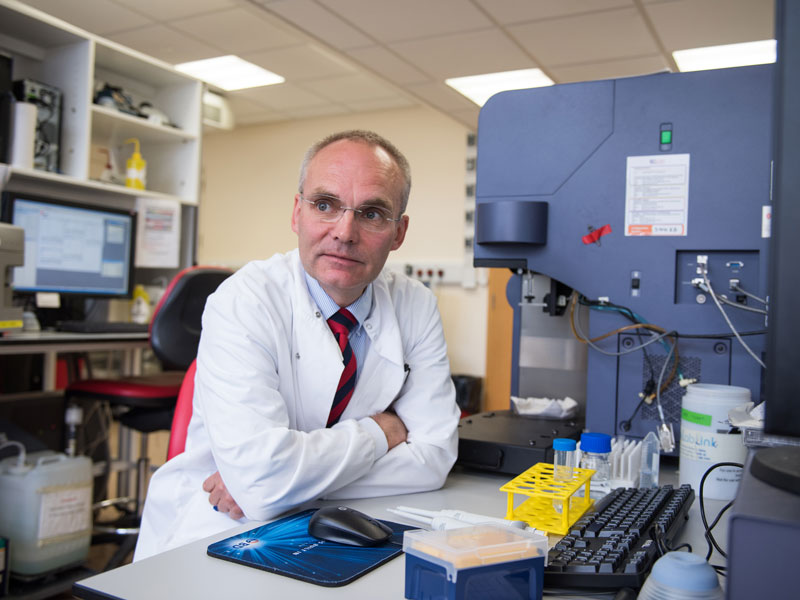Battling multiple sclerosis
Affecting 1 in 1,000 people, multiple sclerosis (MS) is an autoimmune disease in which the body’s immune system attacks its own brain and spinal cord. Professor Lars Fugger’s research at the Nuffield Department of Clinical Neurosciences is being supported by donors including the Alan and Babette Sainsbury Charitable Fund, The Frances and Augustus Newman Foundation and the Rosetrees Trust.
MS, most commonly occurring in women in their 30s, can manifest itself through symptoms varying from a numb thumb to sudden blindness; commonly these symptoms then disappear completely in what is known as a ‘relapsing-remitting’ process. The suddenness and unpredictability of these manifestations add to the stresses of the disease – and diagnosis is far from straightforward.
Professor Fugger’s desire to find out more about MS was first stimulated as a young medical student in 1981, when he was earning some extra money by working as a carer for hospital patients. One of the first patients he looked after was a young woman with MS. He takes up the story: ‘She was paralysed up to her neck; she couldn’t do anything. But she was in a really good mood – and that’s one of the bizarre things about MS. Sometimes the patient will experience euphoria, because MS is affecting the part of the brain that leads to that emotion.’ The strangeness of this encounter left its mark and became the catalyst for Professor Fugger’s career in MS research.
Research has shown that it is possible to make a difference – we’ll do whatever it takes to move forward.
Professor Lars Fugger
No treatment was available for that patient in 1981. Subsequently, different strands of research led to the realisation that the immune system was playing a sinister part. Researchers realised that if they could find a way to, as the professor describes it, ‘rein in the immune system, and keep a lid on it’, they might be able to offer patients some treatment. As a result, doctors today have eight different immuno-modulatory treatments they can prescribe for MS patients. These all carry significant side effects over time, however, so the quest now is to find drugs with fewer side effects, and which are effective for every patient. The ultimate goal, not yet achievable, is to be able to stop the disease from progressing into its secondary phase where it no longer goes into remission and deterioration proceeds at a higher rate.
One line of investigation involves the ‘repositioning’ of drugs – or, as Professor Fugger puts it more simply, ‘teaching old drugs new tricks’. Drugs generally have more than one effect – there is a malaria drug, for example, which can also be used to treat arthritis. The idea is to exploit these multiple effects by taking a drug normally prescribed for one disease and using it to treat another. Drugs which have been in existence for some years have a well-known side-effect profile, allowing the development stage to be fast-tracked right down to around two years (from a usual ten). They are also very much less expensive.

In this way Professor Fugger has found that a drug used to treat hypertension also has some efficacy against neurodegeneration, which is part of MS.
Professor Fugger’s group is involved in several collaborations, including with Professor Gilean McVean of the Big Data Institute. MS seems to share some factors with two different groups of diseases: those involving the immune system, such as rheumatoid arthritis, psoriasis and type 1 diabetes; and those involving neurodegenerative conditions of the brain, as in Parkinson’s disease and Alzheimer’s. Data sets relating to all these are being analysed for any patterns or commonalities which could help in identifying new therapeutic strategies against MS.
I’ve seen over the years that there is light at the end of the tunnel, and that if you just push, you will make a difference.
Professor Lars Fugger
Another line of enquiry derives from an observation which is not in itself new: that the symptoms of MS subside in pregnant women. It appears that the immune system is somehow reconfigured during pregnancy. Researchers are attempting to find out exactly what is happening, and whether this could be replicated for use in treating patients.
Professor Fugger stresses the benefit of attacking MS from various fronts simultaneously, collaborating with other groups and viewing every technology available as a potential tool in the quest to understand the workings of the disease. The vital factor, what he calls ‘the real game changer’, is funding provided by donors. This has incredible importance if his group is to pursue the sort of financially high-risk but potentially high-gain research which has the greatest chance of making a difference in the fight against MS.
Support the Nuffield Department of Clinical Neurosciences